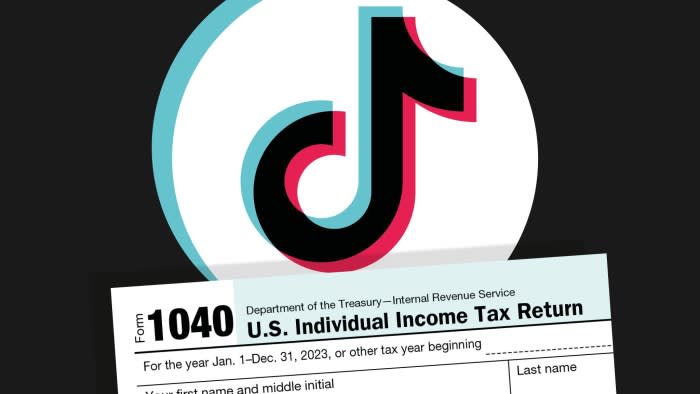TikTok workers in the US have been saddled with millions of dollars in tax liabilities on shares they are unable to sell, at a time when the Chinese-owned video-sharing app is battling a potential US ban.
ByteDance, the app’s Beijing-based parent, is facing a backlash from US employees over a stock awards programme that blocks them from cashing in their shares while leaving them exposed to a large potential tax bill, according to interviews with more than a dozen current and former workers.
The frustrations pit some of TikTok’s US workers against the company at a sensitive time for its leadership. The US Senate is weighing a bill that would force the sale of the app over national security concerns, or have it banned.
Nnete Matima, who in August left her job as a TikTok sales executive, said she was on the hook for a “potentially substantial” tax bill. “There are people who have a six-figure tax liability on [income] that they have never received,” she said.
One of those people is Patrick Spaulding Ryan, who worked at ByteDance as a manager between 2020 and 2022, and must pay a tax bill of more than $100,000 on shares he has been unable to sell.
“This is a horribly managed company,” said Spaulding Ryan. He has sent letters of complaint to the Internal Revenue Service, the Department of Labor and the Securities and Exchange Commission about ByteDance’s handling of share awards.
ByteDance acknowledged employees’ concerns in a memo to US staff on Saturday, arguing that its tax practices are “compliant” with US law. External law firms and a Big Four accounting firm have assessed the share-based pay scheme, the memo said.
ByteDance aims to provide “significant buyback opportunities based on the company’s situations each year”, the memo to staff said.
“Our goals are to address the liquidity issue for [restricted stock units] in the US, provide competitive compensation and enable employees to benefit from the company’s growth,” it added.
However, ByteDance is unlikely to organise a large financing round from investors to buy employee shares or carry out an initial public offering while its future in the US is uncertain.
A TikTok spokesperson said: “We strictly adhere to the requirements of US tax laws. Given this is the first tax year after this buyback program was launched, we also have provided an on-call service for employees to have their questions and concerns addressed.”
The Chinese group has about 7,000 workers in the US, plus thousands of former employees. Globally, ByteDance employees own 20 per cent of its shares, according to a company statement last year.
It has regularly granted shares to employees in the form of restricted stock units. RSUs have no tangible value until they are vested, at which time they are assigned a fair market value and are taxed as ordinary income in that year.
Billions of dollars of ByteDance RSUs vested last year after the group, in an effort to appease employees, waived a “liquidity event” trigger for the stock units. This meant workers no longer needed to wait for the company to list publicly before cashing in their shares, said several people familiar with the matter.
However, the move also meant share awards then became subject to income tax. The number of RSUs ByteDance withheld to cover the tax liabilities was insufficient in many cases, leaving many individuals needing to make an additional cash payment to the Internal Revenue Service.
Since then, ByteDance has held only small buyback programmes — in some cases offering to buy shares far below the value at which they will be taxed, according to ex-staff — and has restricted individuals from selling their shares to outside investors.
ByteDance’s valuation meanwhile soared from about $100bn in 2020 to $268bn in December 2023, prompting those employees who were granted RSUs years ago to expect a windfall when they vested them. Instead, the lack of liquidity has meant large numbers of people are unable to sell shares to cover their tax liabilities.
Some former employees have been told their stock is worth about 20 per cent less than those held by current staff, but they still owe tax based on the higher price.
ByteDance has imposed strict non-disparagement clauses on employees receiving stock awards, blocking them from criticising the company and complicating any challenge.
Matima, who is suing ByteDance for alleged racial discrimination, said she was considering her legal options over the tax issue. TikTok has said that it takes employee concerns “very seriously” and has a strong record of “championing diversity and inclusion”.
TikTok’s US business denies it shares data related to its US users with entities in China. However, the dispute over RSUs shows that may not be the case for information about its US employees.
Several current and former employees said they were unable to access and review information easily about their shares in the company, noting the ownership details are managed via ByteDance’s China-based stock platform.
Other tech start-ups have made arrangements to help staff pay tax bills on vested RSUs.
Last year, payments business Stripe arranged a $6.5bn deal that allowed employees to sell the number of shares necessary to cover the tax liability on vested RSUs. Instacart, a grocery delivery start-up, carried out an IPO in part to create liquidity for employees who had been granted RSUs.
In December, ByteDance offered to buy back roughly $5bn of employees’ vested shares. Former workers claimed the company’s formula for purchasing shares in the scheme was “arbitrary” or “unclear”.
ByteDance has reported the fair market value of its shares at about $158 per share, according to a document seen by the Financial Times. However, five former staff members said the company late last year offered to buy back shares from current employees at $160 each, compared with $128 to those no longer working there.
In another plan, ByteDance last month offered to purchase employees’ stock at about $171 each, or $145 based on the stockholder’s “employment or service relationship with the company”, according to a separate document seen by the FT.

Robert Johnson is a UK-based business writer specializing in finance and entrepreneurship. With an eye for market trends and a keen interest in the corporate world, he offers readers valuable insights into business developments.








